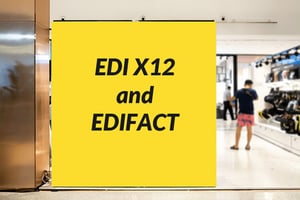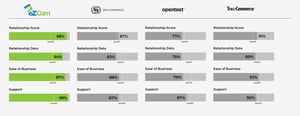OTIF. It means On Time In Full.
Others call it DIFOT. Delivered In Full On Time.
No matter what name you give it, for suppliers trying to meet delivery standards, it could mean something else.
Like OMG. As in OMG, I need to deliver when? And how much? And how much does it cost me if I don’t meet the requirements?
Standards are becoming tougher and tougher. Many retailers, trying to handle the rapid shifts in consumer demand, want goods to arrive within a very specific window of time. And that window is only getting smaller.
Walmart Introduces New EDI Specifications
In July of 2017, Walmart changed its EDI specifications, and now requires orders to arrive within a two-day window. What’s more, the order needs to be 100% in full, in that window, at least 75% of the time. UPDATE: In February of 2018, orders need to arrive 100% in full 95% of the time.
Sheesh. Those are tough standards. But it’s what you should expect when you’re selling to a major retailer like Walmart. Or Target. Or Bed Bath & Beyond. These are stores that can deliver huge sales for suppliers. In exchange for the exposure and sales boost they provide, they have demanding requirements.
Staying Compliant with Your Trading Partners
How do you make sure you stay compliant? Well, you start by working with an EDI provider that can help make sure it happens. It’s not every EDI solution that can handle challenging requirements, and Walmart’s are some of the toughest.
The stakes are high. If you fail to hit the benchmarks during a single month, you’ll be charged 3% of the value of that order. Considering the size of most Walmart orders, a 3% chargeback could be especially costly.
If you’re a supplier who has been in Walmart stores for several years, you are already familiar with strict compliance requirements. In fact, you may have accepted chargebacks as a cost of doing business with a store that dominates the retail landscape. That attitude, however, needs to change — the stakes are higher and if you work with the right EDI partner, you can make significant strides toward ending these recurring costs.
Not Getting EDI Right Costs You Money
That’s because one of the main causes of failing to meet Walmart’s standards, or the standards of any Trading Partner, is the failure to exchange EDI documents correctly. If your mapping isn’t up to date, you can easily end up with multiple errors. Your EDI provider should not only offer seamless integration with your own ERP or back-end system, its software needs to provide validation checks that can prevent mistakes.
Walmart isn’t implementing these new standards to punish suppliers. It’s a response to the ever-more-impatient consumer, a shopper who expects to find the products they want the moment they decide to purchase them. It’s a consumer-driven supply chain, and meeting stringent standards like the ones that Walmart has introduced reflect the modern retail marketplace. Retailers have instituted short windows because their customers will quickly move on if they can’t find the products they seek.
With Great EDI, Tough Requirements Help You Sell More
As daunting as the new Walmart standards can seem, there is a silver lining.
If you’re a supplier who can consistently meet the requirements of Walmart and other major retailers, you will enhance these important business relationships. While great products are a must, being dependable matters, too. Suppliers that are on top of EDI, working with a provider that is constantly updating Trading Partner requirements and upgrading their software to improve efficiencies, will develop a valuable reputation for reliability.
The bottom line: EDI can be more than a cost of doing business. When it’s done well, it can actually be a business builder.






